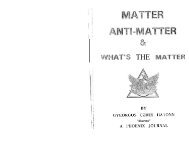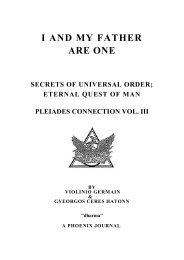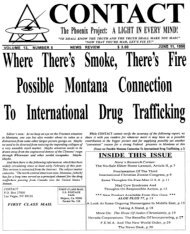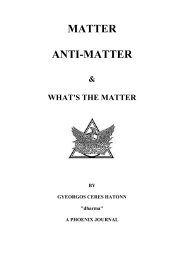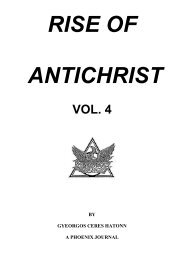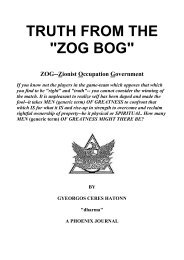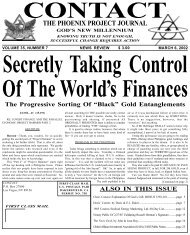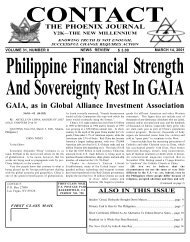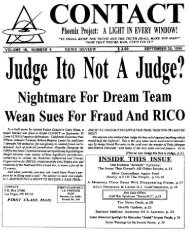VOL. 2 - Phoenix Source Distributors
VOL. 2 - Phoenix Source Distributors
VOL. 2 - Phoenix Source Distributors
You also want an ePaper? Increase the reach of your titles
YUMPU automatically turns print PDFs into web optimized ePapers that Google loves.
individual initiative to assert itself under fair competitive conditions.<br />
If, therefore, the Jews had retained their status as a nation, and had remained in Palestine under<br />
the Law of Moses, they would hardly have achieved the financial distinction which they have since<br />
won. Jews never got rich out of one another. Even in modern times they have not become rich out of<br />
each other but out of the nations among whom they dwelt. Jewish law permitted the Jew to do<br />
business with a Gentile on a different basis than that on which he did business with a brother Jew.<br />
What is called "the Law of the Stranger" was defined thus: "Unto a stranger thou mayest lend upon<br />
usury; but unto thy brother thou shalt not lend upon usury".<br />
Being dispersed among the nations, but never merging themselves with the nations and never<br />
losing a very distinctive identity, the Jew has had the opportunity to practice "the ethics of the<br />
stranger" for many centuries. Being strangers among strangers, and often among cruelly hostile<br />
strangers, they have found this law a compensating advantage. Still, this alone would not account<br />
for the Jew's preeminence in finance. The explanation of that must be sought in the Jew himself, his<br />
vigor, resourcefulness and special proclivities.<br />
Very early in the Jewish story we discover the tendency of Israel to be a master nation, with other<br />
nations as its vassals. Notwithstanding the fact that the whole prophetic purpose with reference to<br />
Israel seems to have been the moral enlightenment of the world through its agency, Israel's "will to<br />
mastery" apparently hindered that purpose. At least such would seem to be the tone of the Old<br />
Testament. Divinely ordered to drive out the Canaanites that their corrupt ideas might not<br />
contaminate Israel, the Jews did not obey, according to the old record. They looked over the<br />
Canaanitish people and perceived what great amount of man-power would be wasted if they were<br />
expelled, and so Israel enslaved them--"And it came to pass, when Israel was strong, that they put<br />
the Canaanites to tribute, and did not utterly drive them out". It was this form of disobedience, this<br />
preference of material mastery over spiritual leadership, that marked the beginning of Israel's agelong<br />
disciplinary distress.<br />
The Jews' dispersion among the nations temporarily (that is, for more than 25 centuries now)<br />
changed the program which their scriptures declare was divinely planned, and that dispersion<br />
continues until today. There are spiritual leaders in modern Judaism who still claim that Israel's<br />
mission to the nations is spiritual, but their assertions that Israel is today fulfilling that mission are<br />
not as convincing as they might be if accompanied by more evidence. Israel throughout the modern<br />
centuries is still looking at the Gentile world and estimating what its man-power can be made to<br />
yield. But the discipline upon Israel still holds; he is an exile from his own land, condemned to be<br />
discriminated against wherever he goes, until the time when exile and homelessness shall end in a<br />
reestablished Palestine, and Jerusalem again becomes the moral center of the Earth, even as the<br />
elder prophets have declared.<br />
[H: This was quite true in 1920, but surely it is CLEAR that after the formation of the United<br />
Nations and then the "voting in" of "Israel" OUT OF PALESTINE, everything changed. But,<br />
the point was, even then, TRULY NOT an Israel in the hardship places of a Palestine now<br />
become Israel--but a NEW JERUSALEM to be the NEW HOMELAND of this reassembled<br />
people--in the North American continent and centered in that which is today known as the<br />
United States of America.]<br />
Had the Jew become an employee, a worker for other men, his dispersion would not probably<br />
have been so wide. But becoming a trader, his instincts drew him round the habitable Earth. There<br />
were Jews in China at an early date. They appeared as traders in England at the time of the Saxons.<br />
Page 81



